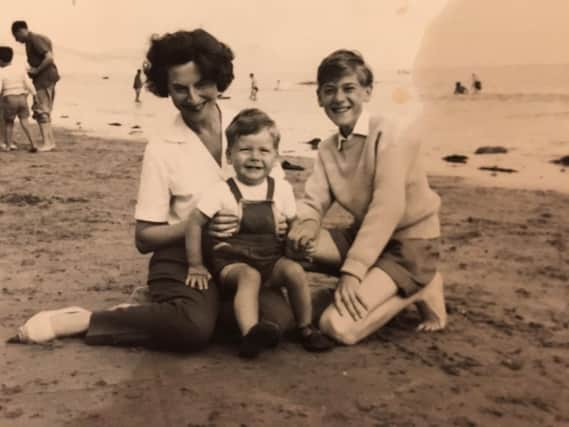Rory Cellan-Jones: 'My mother’s life, revealed one letter at a time'


My mother, Sylvia Rich, arrived at Ruskin Park House in London in 1955, with her 13-year-old son, to take up a new job in television at the BBC. She had written to a friend about the new home: ‘It really is much nicer than the usual Council flats, central heating, constant hot water, quite new, and situated on top of a hill with a delightful little park just outside.’
It was, however, very small – Stephen had the one bedroom while Sylvia slept in the living room on a couch. Then in 1958 I came along and it was even more cramped.
Advertisement
Hide AdFrom very early on I was miserable there. At first I had a strong bond with my mother. We would sing along to Puff the Magic Dragon or laugh at Round the Horne. But as time went on, Mum grew increasingly eccentric and possessive, before sinking into depression in my teenage years.
I escaped, but my mum did not.
*
A few days after her funeral in 1996, I drove over to clear out the flat before it was handed back to the council.
Opening the door, the familiar smell of the overheated flat hit me. Looking around, it struck me how sad a picture of her life the flat painted. Much of the furniture was cheap and flimsy, dating back to the 1950s when Sylvia and Stephen first moved in.
It was as I began to open drawers, look under the bed, and investigate behind the dressing table, that I became aware of something extremely valuable. Everywhere, there were bundles of letters, along with folders full of BBC memos, my school reports and legal documents. She had even kept carbon copies of just about every letter she had typed.
I immediately recognised the handwriting in hundreds of letters from her two sisters, my aunts Bunty and Joan. I skimmed through some, and they painted a vivid picture of what it was like to be a woman in Britain from the 1940s to the 1990s.
Next, I found a sheaf of letters from the war. With her husband away, she found herself a job in the radio talks department in Bristol. By day, she was mixing with poets and artists and giving her boss Geoffrey Grigson her opinion of their scripts; by night, she was sheltering from bombs or going dancing with American officers. Oh, and taking a few weeks off in 1942 to give birth to Stephen.
Advertisement
Hide AdThere appeared to be mountains of letters telling the story of her separation from her husband, sparked by his distaste for her BBC job. Then I came across a batch that made me catch my breath. They were in a small rectangular red stocking box with ‘Charmed Life by Kayser’ printed on the lid. In my mother’s familiar handwriting, I saw this: ‘Keep for myself & Rory later.’ Opening it, I first saw a brown envelope with another message: ‘For Rory, to read and think about in the hope that it will help him to understand how it really was.’ Inside was a bundle of love letters which told the story of how I came to be born and how I was very nearly given away to lead a different life under another name.
I crammed the letters into a filing cabinet at home and over the next 25 years barely looked at them. Yes, I still had a whole series of questions about the circumstances of my birth but the answers might prove hurtful to at least one person I had grown close to in recent years. The father I had met only in my twenties.
*
Advertisement
Hide AdWhen I finally returned to the letters again, I was soon gripped.
It was a voyage of discovery, both exciting and at times deeply painful. I was finding out that the mother I had found neurotic, silly, sometimes deceitful and often deeply annoying had been a quite remarkable woman. She had left school at 14, but she was a better writer, a more perceptive observer of the world around her, of the people that she met and of her own foibles, than I had ever imagined.
Above all, she was brave, fiercely determined to bring up her two sons as she saw fit and to give them the best education she could possibly afford. Stephen and I were the two great loves of her life, followed by the BBC, and, when she was in a sentimental mood, my father Jim.
But I realised we had all let her down in different ways. The BBC had opened a door into a whole new world but then shut it when she tried to use her undoubted gifts in a more challenging and better-paid job. Her sons had grown tired of her long tales about her past and had too often failed to give her the respect she deserved. As for my father, well, the legal file appeared to show that he had made promises to her that he had been unable to keep.
Writing Ruskin Park has at times been a gruelling experience as I lived through Sylvia’s struggles and the emotional trauma. But by leaving behind such a frank and detailed account of her life she has done what she intended when slipped that note into the box containing her most intimate and painful secrets.
Yes, Mum, I think I do now understand how it really was.
Thank you.
Ruskin Park: Sylvia, Me and the BBC by Rory Cellan-Jones is available now, published by September Books priced at £18.99.Rory will be appearing at the Wigtown Book Festival on Sunday 1 October at 1:30pm, www.wigtownbookfestival.com